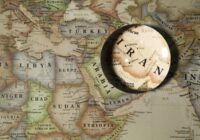China’s military strategy takes a substantial leap with the construction of its first overseas military installation in Djibouti.
The People’s Liberation Army (PLA) of China will soon take control of a dual-use port facility in Djibouti. Designed to serve both military and civilian functions—thus the moniker of dual use—the naval installation will serve China’s national interests in the western Indian Ocean region and can be used as a platform for operations in the Middle East and Africa.
This is the first overseas military base for the People’s Republic. The PLA has historically focused its efforts at protecting China’s borders, which made the military an army-, not naval-, dominated force. This base, estimated to be finished in early 2017, demonstrates that the PLA is increasingly interested in the maritime domain. Once a bloated organization tied down by inefficiency and poor strategic planning, the PLA is becoming increasingly more efficient, technologically competitive and strategically prepared.
The base being constructed in Djibouti is evidence of this. The position of the base is strategically sound and does not substantially risk stoking regional tensions due to its existence. More than anything, the PLA base in Djibouti reveals where Beijing plans to deepen its footprint and that it is increasingly ready to shoulder the risks that follow from such an act.
Why Djibouti?
Djibouti might seem too far afield from the Chinese homeland to make sense as Beijing’s first foreign military installation. Logistically, Djibouti is a difficult location, but from a political and strategic vantage there are few better locations anywhere in the world.
For starters, China’s immediate vicinity is tension-filled. Relations with its East Asian neighbors have soured for the most part since President Xi took control in 2012, in no small part due to China’s more aggressive foreign policy since the new government arrived and a series of missteps that seemingly were designed to insult other states in East Asia.
Central Asia is a major destination for Chinese foreign investment and it could have been a location for a facility in support of land operations, but Central Asia remains a region where Russia’s shadow looms large and where suspicion of China’s intentions for the region have increased since the announcement of Xi’s One Belt, One Road Initiative.
A dual-use naval facility remains a possibility in South Asia, particularly at Gwadar in Pakistan, where the infrastructure already largely exists to establish a dual-use facility. China has nurtured relationships with several states in South Asia, but the region’s politics have and will continue to prove unstable. Furthermore, India’s fear of a Chinese military presence in close proximity would inevitably lead to increased tensions. One day a base in South Asia may be a necessity, but today it would be too high a risk.
Djibouti is located in the Horn of Africa, giving China the ability to project strength in both the western Indian Ocean and the Mediterranean. The installation is located amidst a region where China enjoys a positive reputation. The location also provides a base of operations for the People’s Liberation Army Navy’s (PLAN) ongoing counterpiracy operation in the western Indian Ocean.
China has put considerable national resources into the modernization of its armed forces and expansion of its foreign policy reach. This process has been a slow progression, but the base in Djibouti represents both a benchmark for the sophistication of the armed forces and as a culmination of investment in being able to build and sustain distant military operations.
Concern, Not Opposition
China’s enhanced military capability is a source of concern for other major military powers around the world. Look no further than the South China Sea, where China’s burgeoning military strength has changed the nature of maritime disputes and contributed to an increase in the militarization of those waters.
The region surrounding the Horn of Africa, by contrast, has been a source of international cooperation, not regional contestation. The threat of piracy off the Somalian coast helped to establish Combined Task Force (CTF) 151, a multilateral partnership that patrols the waters near the Horn of Africa to protect maritime trade and counter threats at sea. While China did not formally join CTF 151, PLAN has actively cooperated with other nations since arriving in the western Indian Ocean in 2008.
The base in Djibouti provides a dedicated repair and resupply facility for vessels engaged in maritime security and counterpiracy operations. China has also become over the course of the past decade one of the largest contributing nations to United Nations Peacekeeping Operations (PKO). Currently, PLA peacekeepers are deployed in Mali, the Congo, Lebanon, Liberia, and South Sudan. Djibouti provides a central location to assist in both the deployment of peacekeepers and to supply such missions.
 Fair Observer provides you deep and diverse insights for free. Remember that we still have to pay for servers, website maintenance and much more. So, donate now to keep us free, fair and independent.
Fair Observer provides you deep and diverse insights for free. Remember that we still have to pay for servers, website maintenance and much more. So, donate now to keep us free, fair and independent.
Beijing has substantial interests in Africa and the Middle East. Infrastructure projects throughout Africa have facilitated trade between China and a host of states. The Middle East remains the primary source for the natural resources that fuel “factory China.” Greater ties between China and regional states translates into greater exposure to a host of security concerns, including piracy, terrorism, smuggling, and conflict. China, while still rejecting any notion that it will insert itself as an actor in any dispute away from its homeland, desires to possess the ability to better protect its goods, materials, and citizens.
Other global powers have taken a wait-and-see approach to this new Chinese base. The United States, the most active global power in the western Indian Ocean region, also maintains a base in Djibouti. Where relations in East Asia have become complicated between China and the US, in Africa, the Middle East and connected maritime regions, there are several avenues of bilateral cooperation, at least in theory.
Global Player
China’s stronger position in the region may prove to assist greater cooperation on a host of vital issues and help to dispel the viewpoint that China is and seeks to remain a free rider in global affairs. Yet China’s first base could also be a launching point for China to complicate US interests in the region, including gaining the favor of the Djibouti state over the US. The impact of China’s base will not be seen for some time, but the fact that other powers, especially US, are not inherently opposed to a deepened presence by the PLA in this region shows that China’s choice of location was a clever one.
China has become a global player. Its successes in diplomacy and trade have increased Beijing’s influence, but that success also brings with it increased threats. China’s citizens and property are today at greater risk to terror, piracy and theft as they have ever been before.
As such, the Chinese state recognizes that it must invest in the military and security sectors in order to protect the nation’s interests. This process within East Asia, where China’s efforts have been more aggressive, has led to increased tensions between Beijing and Washington (and most of the rest of East Asia). At the meeting point of Africa and Asia, however, China’s efforts thus far have increased Beijing’s ability to protect its interests while not undermining regional security efforts. China is unlikely to become a major military player in Africa and the Middle East anytime soon, but what the base in Djibouti clearly shows is that China is determined to have a global military reach.
The views expressed in this article are the author’s own and do not necessarily reflect Fair Observer’s editorial policy.
Photo Credit: Brasil2
Support Fair Observer
We rely on your support for our independence, diversity and quality.
For more than 10 years, Fair Observer has been free, fair and independent. No billionaire owns us, no advertisers control us. We are a reader-supported nonprofit. Unlike many other publications, we keep our content free for readers regardless of where they live or whether they can afford to pay. We have no paywalls and no ads.
In the post-truth era of fake news, echo chambers and filter bubbles, we publish a plurality of perspectives from around the world. Anyone can publish with us, but everyone goes through a rigorous editorial process. So, you get fact-checked, well-reasoned content instead of noise.
We publish 2,500+ voices from 90+ countries. We also conduct education and training programs
on subjects ranging from digital media and journalism to writing and critical thinking. This
doesn’t come cheap. Servers, editors, trainers and web developers cost
money.
Please consider supporting us on a regular basis as a recurring donor or a
sustaining member.
Will you support FO’s journalism?
We rely on your support for our independence, diversity and quality.






